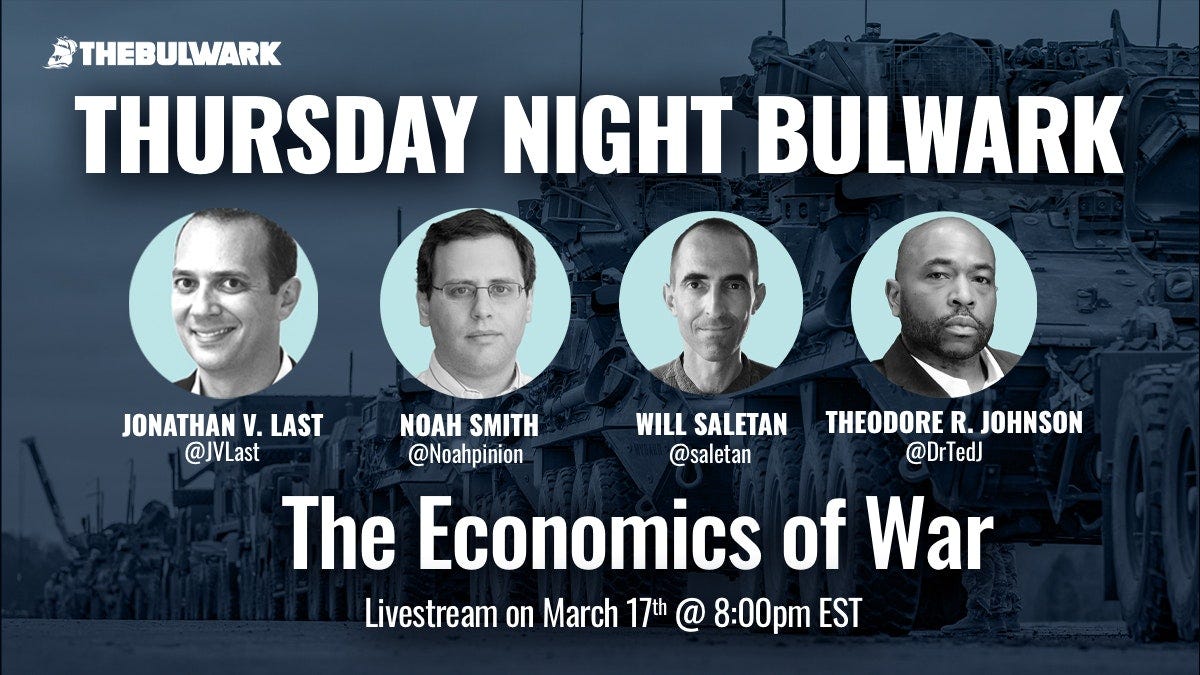Recently at The Bulwark:
CHARLIE SYKES: Zelensky's Heartbreaking Plea
THE NEXT LEVEL: Realignment Is Real. 🔐
George Conway: Claiming to Be ‘Completely Insane and Stupid’ May Be Trump’s Best Defense
You can support The Bulwark by subscribing to Bulwark+ or just by sharing this newsletter with someone you think would value it.
CATHY YOUNG: Two Years of Covidiocy.
Proponents of limited government and individual liberty have had valid reasons to worry about the vast expansion of government power and the drastic curbs imposed on people’s personal freedoms for the sake of combating the pandemic. The belief that politicians and bureaucrats don’t like to relinquish powers that are meant to be temporary has been often vindicated in the past. Critical voices questioning the usefulness or the ethics of various mandates and prohibitions are never more essential than in the kinds of crises that create a strong temptation to trade freedom for safety.
This is especially true given that some progressives did, by their own admission, want to use the pandemic as an opportunity for a permanent shift away from what they saw as excessive individualism. As Canada went into lockdown in March 2020, Toronto Star columnist Shree Paradkar pointed to drastic measures taken in the public and private sectors as examples of how “radical change” can happen quickly with proper motivation. Paradkar exultantly announced that Canada had “discovered collectivism” and that feminists, anti-racism activists, and “equity leaders” were “getting an unexpected glimpse into what an actual enforcement of their demands would look like.” You don’t need to be particularly right-wing to find such rhetoric disturbing.
RICH THAU AND MATT STEFFE: Swing Voters: Biden’s Not Strong, But He’s Competent.
We interview “Trump-to-Biden” voters every month in our Swing Voter Project. Our most recent sessions were held the night after the State of the Union Address. They revealed both red flags and some positive signs for Biden and Democrats.
One of the top issues that concerned these 13 swing voters—eight independents, one Democrat, and four Republicans—was the war in Ukraine. Among the nine who have formed an opinion about how President Biden is handling Ukraine, six praised him.
“I think [President Biden] is being smart, and he’s being advised to be smart to move slow and be decisive,” said Bill, 64, from Gilbert, Arizona. “You do not want to box a country with nuclear weapons into a corner where there’s no way to get out. I think that it needs to be this continuous, escalating pressure to achieve what we want to do. I think he’s doing it correctly, and he’s trying to get—and he’s been successful in getting—the people most greatly affected—the Europeans—to be involved.”
But some were frustrated by Biden’s leadership.
In a taste of what’s to come, Lawfare’s David Priess and Charlie Sykes have different takes on Zelensky’s request for a no-fly zone. Also on the podcast, the Biden administration’s use of intelligence to play with Putin’s head.
Bulwark+ members can listen to an ad-free version of this podcast on the player of their choice. Learn more at Bulwark+ Podcast FAQ.
Noah Smith of the Noahpinion joins JVL, Will and Ted at 8:00 p.m. ET on Thursday, March 17 for a discussion of the economics of war.
Exclusively for Bulwark+ members!
NIRANJAN SHANKAR: Blaming America for Russian Aggression, Then and Now.
Perhaps the most well-known of these works is historian William Appleman Williams’s The Tragedy of American Diplomacy (1959). According to Williams, American foreign policy was motivated primarily by a relentless pursuit of foreign markets to facilitate the expansion of the domestic economy. This insistence on maintaining an “open-door empire” of free trade was what ultimately crystallized the Cold War. Williams contends that Stalin wanted “minimum natural and desirable frontiers in eastern Europe” but that U.S. officials resisted such an arrangement and failed to consider “security and economic aid for the Soviet Union” that would lead to “a modus vivendi with the Russians”—not out of “fear that Russia was about to overwhelm Europe or the world in general” but out of a desire to penetrate European and Asian economies. The Soviets had legitimate concerns over Eastern European boundaries, German reparations, post-war recovery, and agreements in the Middle East and Asia, but selfish and expansion-minded American diplomats refused to listen. In trying to explain why Moscow refused Marshall Plan aid, Williams claims that Stalin rightly saw it as an attempt to interfere in his country’s internal affairs.
In Tragedy, Williams is also at pains to argue that the Soviet Union was not a dynamically expansionist state that posed a genuine threat to the West. Many within the Soviet political hierarchy, he alleged, believed in cooperation with the United States to achieve post-war recovery goals, and were even willing to temper their criticisms of capitalism and support for Communist groups in Europe to get on Washington’s good side. But U.S. public and private leaders, all too eager to exploit the then war-weakened Soviets, ignored these warm overtures from Moscow and instead peddled a “false analogy between Soviet Russia and Nazi Germany,” and between Stalin and Hitler, to justify an anti-Soviet posturing. American and British hostility, in the form of Winston Churchill’s “extremely violent and unrestrained anti-Soviet ‘Iron Curtain’ speech” (delivered upon Harry Truman’s invitation) and the declaration of the Truman Doctrine, had the adverse effect of empowering the hardliners in Moscow. Thus, it was supposedly Washington’s intransigence that pushed the Soviets to abandon their “relatively restrained policies followed in eastern Europe after the Nazis were defeated” and crack down on opposition in the Soviet bloc “to establish a security perimeter.”
🚨OVERTIME 🚨
Happy Wednesday! I am glad to report that I lost precisely zero Swiss Army Knives on this trip. As opposed to Thanksgiving, where I lost… two.
I was able to visit the Bonita Springs Elks, and a complimentary license plate adorns my home office now. I encourage all readers to join an “animal club” near them. You will be glad you did.
What is going on with Ukraine’s nuclear power plants? Don’t worry, we have you covered.
Liz Cheney’s secret fundraiser…. A dispatch from Mona Charen.
Sarah Longwell’s objection to the Don’t Say Gay law. A must read.
Uh… The Idaho Lt. Gov. might need media training.
Zelensky’s address to congress… Make some time for this.
That’s it for me. Tech support questions? Email members@thebulwark.com. Questions for me? Respond to this message.
—30—
Editorial photos provided by Getty Images. For full credits, please consult the article.





